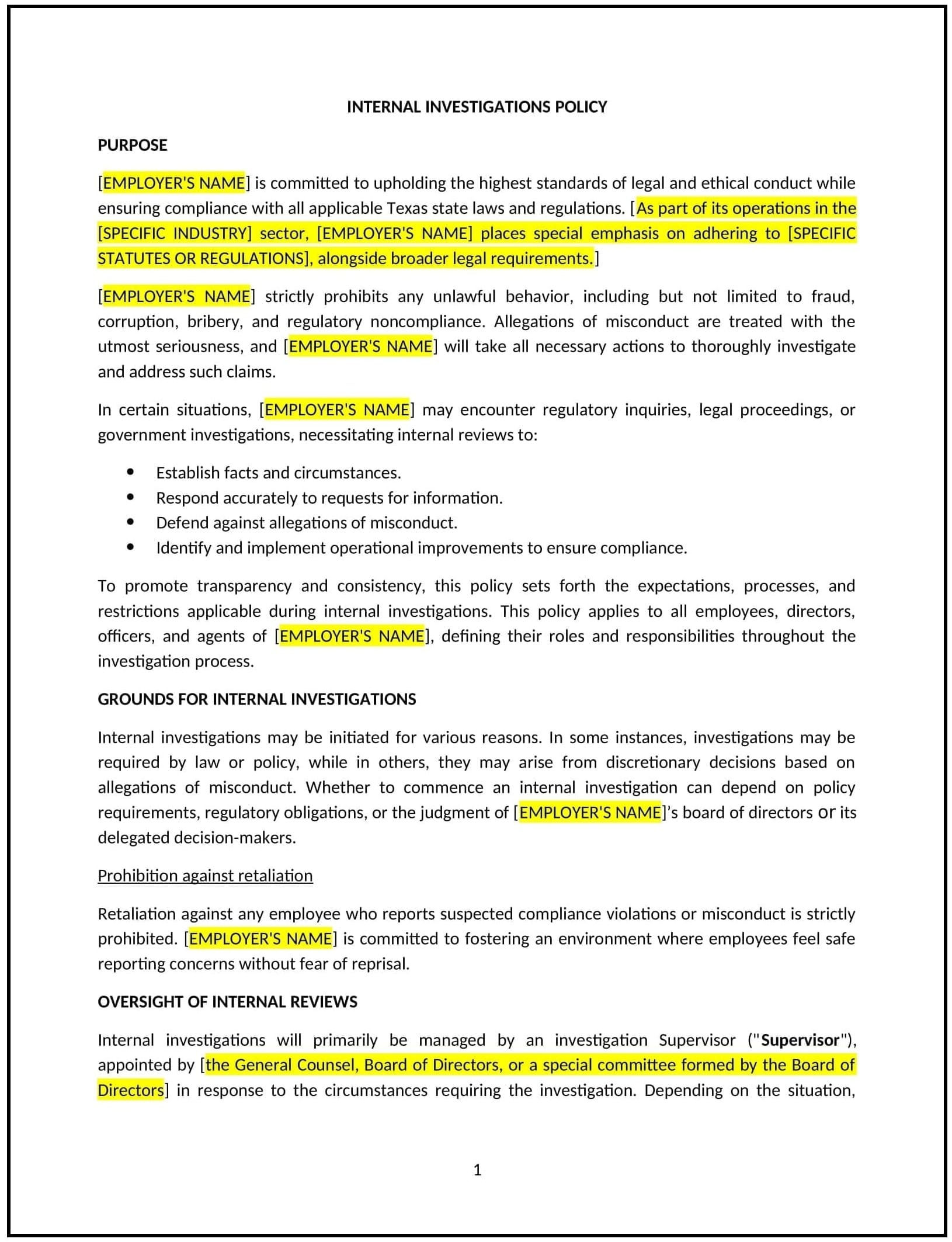Internal investigations policy (Texas): Free template
Got contracts to review? While you're here for policies, let Cobrief make contract review effortless—start your free review now.

Customize this template for free
Internal investigations policy (Texas)
This internal investigations policy is designed to help Texas businesses establish clear guidelines for conducting internal investigations into potential violations of company policies, misconduct, or illegal activities. The policy ensures that investigations are carried out fairly, confidentially, and in compliance with Texas state laws and federal regulations.
By adopting this policy, businesses can maintain a transparent and accountable workplace, protect employee rights, and promote compliance with legal requirements while investigating allegations of misconduct or violations.
How to use this internal investigations policy (Texas)
- Define the scope of investigations: Clearly specify the types of issues or allegations that warrant an internal investigation, such as harassment, discrimination, theft, fraud, policy violations, or illegal activities.
- Outline the investigation process: Detail the steps for conducting an investigation, including how complaints are reported, how investigations are initiated, and the procedures for gathering evidence, interviewing witnesses, and documenting findings.
- Assign investigation responsibilities: Specify who is responsible for conducting investigations, such as HR, compliance officers, or external investigators, and ensure that they have the necessary training and resources to handle investigations appropriately.
- Maintain confidentiality: Emphasize the importance of confidentiality throughout the investigation process, ensuring that information about the investigation is only shared with individuals who need to know and that employees are protected from retaliation.
- Set timelines: Establish reasonable timelines for completing investigations, ensuring that they are conducted in a timely manner while allowing for thoroughness and accuracy.
- Outline corrective actions: Specify the actions that may be taken if a violation is found, such as disciplinary measures, termination, or reporting to law enforcement, and ensure that the response is proportionate to the severity of the violation.
- Address retaliation: Make it clear that retaliation against individuals involved in the investigation, including witnesses and whistleblowers, will not be tolerated and will be treated as a separate violation.
Benefits of using this internal investigations policy (Texas)
This policy offers several benefits for Texas businesses:
- Promotes fairness and transparency: A clear investigation policy helps ensure that all employees are treated fairly and that investigations are conducted in an unbiased, consistent, and transparent manner.
- Protects employee rights: By following a structured investigation process, businesses can ensure that employees' rights are protected during the investigation, including their right to confidentiality and protection from retaliation.
- Ensures legal compliance: The policy ensures that the business complies with Texas state laws, federal regulations, and labor laws regarding internal investigations, reducing the risk of legal liabilities or penalties.
- Reduces workplace misconduct: A clear policy and prompt investigations into alleged violations help deter misconduct and create an environment where employees feel safe reporting issues without fear of retaliation.
- Maintains a positive workplace culture: By addressing concerns and misconduct effectively, businesses can foster a culture of accountability, integrity, and respect within the workplace.
Tips for using this internal investigations policy (Texas)
- Communicate the policy clearly: Ensure that all employees are aware of the internal investigations policy, understand the process for reporting misconduct, and know their rights during an investigation.
- Ensure thorough training: Train managers, HR personnel, and investigators on how to conduct investigations properly, focusing on fairness, confidentiality, and legal compliance.
- Use objective criteria: When conducting an investigation, ensure that decisions are based on objective evidence and consistent with the company’s policies and values.
- Maintain documentation: Keep thorough records of the investigation process, including witness statements, evidence collected, and actions taken, to protect the integrity of the process and ensure that the outcome is well-documented.
- Review regularly: Review and update the policy periodically to ensure it reflects changes in Texas state laws, federal regulations, or best practices in handling internal investigations.